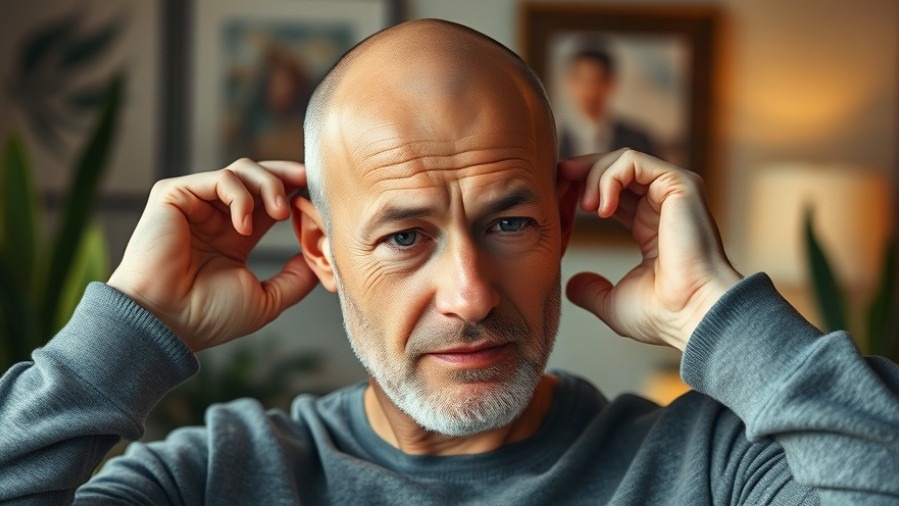
Unlocking the Power of Touch: A Simple Exercise for Mental Wellness
As we age, maintaining our mental health becomes increasingly important. Simple exercises can foster genuine well-being, and one such technique that many may overlook is the practice of tapping behind the ear. But why does it work? Tapping is a segment of acupressure, a practice that focuses on stimulating specific points on the body to relieve stress, promote relaxation, and enhance mental clarity.
In Tap Behind Your Ear…Feel What Happens!, we explore the connection between simple tapping techniques and mental wellness, prompting further insights to help our seniors thrive.
Understanding the Connection Between Sleep and Mental Wellness
For our middle-aged and senior audience, sleep hygiene is crucial. As we age, sleep patterns often change due to factors such as hormonal shifts, lifestyle changes, or stress. In fact, research indicates that a lack of quality sleep can significantly affect cognitive functions, mood stability, and overall mental health. It's critical to understand that sleep and mental wellness are intertwined. Those dealing with conditions like anxiety or depression may find themselves struggling even more without restorative sleep.
Stress Relief Techniques for Seniors: Tapping into Your Body’s Wisdom
Tapping behind your ear is not just a random practice; it can serve as an effective stress relief technique. Whether paired with deep breathing exercises or as a standalone method, this gentle action can encourage the release of endorphins, the brain's natural feel-good chemicals. Incorporating this practice into your daily routine may help ease anxiety and support mental wellness for seniors.
Mindfulness and Meditation: Two Pillars of Relaxation
Expanding upon the tapping technique, incorporating mindfulness can elevate your relaxation experience. Mindfulness exercises for seniors, such as meditation focused on the breath or even guided imagery for sleep, can help ground you and ease the tensions that accumulate throughout the day. It’s beneficial to integrate these practices into a calming bedtime routine, aiding in better sleep and mental clarity.
Herbal Remedies: Nature’s Sleep Assistants
Naturally, seniors might explore herbal remedies like chamomile or lavender. These herbs have been scientifically noted for their calming properties, aiding those suffering from insomnia or anxiety. Consuming herbal teas before bed may serve as a soothing ritual and can significantly aid in relaxing the body and mind, encouraging a peaceful night's sleep.
Building Emotional Strength: Coping with Loneliness in Aging
As many elderly adults face social isolation, it’s important to acknowledge how loneliness can exacerbate sleep issues and mental health concerns. Engaging in activities to build social connections, whether through support groups for mental health or regular interactions with friends, can foster a sense of belonging. Emotional strength can be developed by sharing experiences and learning coping mechanisms together.
Create a Calming Bedtime Space: The Importance of Environment
Reflect on your bedroom environment. Making simple changes—like reducing screen time before sleep, keeping the space dark and quiet, or incorporating relaxing scents through aromatherapy—can drastically improve sleep quality. Comfortable bedding and maintaining a consistent sleep schedule also contribute greatly to achieving deep sleep, vital for cognitive functions.
Actionable Insights: Steps to Better Sleep
Start each evening with a few minutes of tapping behind your ear, combined with deep breathing exercises.
Create a calming bedtime routine that might include journaling for mental clarity and herbal tea.
Sleep with calming music or nature sounds to nurture a soothing atmosphere.
Prioritize social interactions—schedule weekly calls with family or friends.
The journey toward mental wellness in later life doesn't have to be daunting. Embrace these small practices to enhance your emotional resilience and sleep quality. Remember, you're not alone in this; building a supportive community and sharing these practices with peers can profoundly impact the mental wellness of our seniors.
As a reminder, implementing practices that meld physical relaxation with mental well-being can lead to profound results. After all, a well-rested mind fosters a vibrant lifestyle and nurtures emotional strength during life's later chapters.
 Add Element
Add Element  Add Row
Add Row 




Write A Comment